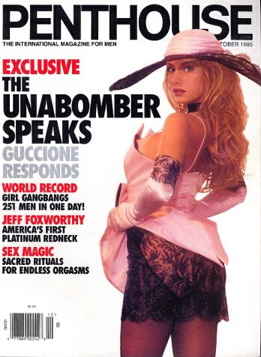rotten > Library > Biographies > Crime > Serial Killers > Unabomber
Unabomber
Ted Kaczynski
 Theodore Kaczynski, PhD was no poseur. He wasn't one of those fake Luddites, who only claim to hate modern technology but can't go three days without HBO. Ted practiced what he preached. You have to give him that.
Theodore Kaczynski, PhD was no poseur. He wasn't one of those fake Luddites, who only claim to hate modern technology but can't go three days without HBO. Ted practiced what he preached. You have to give him that.
The Unabomber's manifesto, submitted to Penthouse magazine and a couple of newspapers, identified a bunch of pet peeves: overcrowding, dissociation from nature, social conformity, rapid pace of technological change, consumerism, corporate domination, etc.
Ted was a true believer. He cranked out that diatribe in a one-room, 10-by-12 plywood shack situated on 1.4 acres of Montana forest. The cabin had no electricity or plumbing. He used a manual typewriter.
It took the FBI 17 years to track the guy down, and they never would have caught him if his brother hadn't recognized Ted's writing and squealed. And that couldn't have happened if Ted hadn't insisted on publishing that manifesto. So really this is Ted's own damn fault.
But he felt compelled to write his essay, which won kudos from the establishment it attacked. One professor at the University of Wisconsin praised the Unabomber's masterful grammar and punctutation. "It's good prose. The sentences flow well into one another, the paragraphs are coherent. The Unabomber even knows how to punctuate, and that's a very rare gift." (That's right, people: he said gift.)
 When it appeared initially that neither the New York Times nor the Washington Post were willing to publish the manifesto in full, Penthouse magazine publisher Bob Guccione stepped forward. He took out a full-page ad in the New York Times to send an open letter to the Unabomber. In it, Guccione pledged not only to publish the essay in its entirety, he also offered a regular column. To get over any misgivings the Unabomber might have, Guccione pointed out the tremendous popularity his magazine held in the corridors of power:
When it appeared initially that neither the New York Times nor the Washington Post were willing to publish the manifesto in full, Penthouse magazine publisher Bob Guccione stepped forward. He took out a full-page ad in the New York Times to send an open letter to the Unabomber. In it, Guccione pledged not only to publish the essay in its entirety, he also offered a regular column. To get over any misgivings the Unabomber might have, Guccione pointed out the tremendous popularity his magazine held in the corridors of power:
"Penthouse is one of the biggest and most quoted magazines in the history of our industry. For 25 years it was and continues to be the single, biggest selling magazine in the Pentagon. If it's attention you want, you'd be hard-pressed to do better."
Ted made contact with Guccione a couple of times, via mail and phone, but they drifted apart after the newspapers finally complied and printed "Industrial Society and Its Future" in unexpurgated form.
His brother David Kaczynski read the thing and got a sinking feeling. David's wife contacted a childhood friend of hers working as a detective at Investigative Group International, the same agency that smeared tobacco industry whistleblower Jeffrey Wigand. The detective lined up some writing analysis experts, and then they went to the FBI.
In jail awaiting trial, Ted attempted to hang himself with his underwear to avoid submitting to a psychiatric evaluation. Well, he got one anyway. The court appointed Sally Johnson, M.D. to determine whether Ted was too nuts to stand trial. This is the same doctor who examined John Hinckley and Jim Bakker.
The shrink's report included a biographical sketch of her subject. Ted was your ordinary 16-year-old Harvard freshman. He went through all the typical traumas, such as suffering through severe depression and "acute sexual starvation," ultimately culminating in what the doctor described as "several weeks of intense and persistent sexual excitement involving fantasies of being a female. During that time period he became convinced that he should undergo sex change surgery."
As a matter of fact, Ted scheduled an appointment with a campus shrink to get the ball rolling. But he chickened out in the waiting room and settled on telling the doctor that he was just afraid of getting drafted. When we walked out the door, Ted's outlook suddenly zigzagged, as described in his diary:
As I walked away from the building afterwards, I felt disgusted about what my uncontrolled sexual cravings had almost led me to do and I felt humiliated, and I violently hated the psychiatrist. Just then there came a major turning point in my life. Like a Phoenix, I burst from the ashes of my despair to a glorious new hope. I thought I wanted to kill that psychiatrist because the future looked utterly empty to me. I felt I wouldn't care if I died. And so I said to myself why not really kill the psychiatrist and anyone else whom I hate. What is important is not the words that ran through my mind but the way I felt about them. What was entirely new was the fact that I really felt I could kill someone. My very hopelessness had liberated me because I no longer cared about death. I no longer cared about consequences and I said to myself that I really could break out of my rut in life an do things that were daring, irresponsible or criminal.
Ted made the decision to keep a diary in the first place primarily because he was worried that people might believe that he was mentally ill:
I intend to start killing people. If I am successful at this, it is possible that, when I am caught (not alive, I fervently hope!) there will be some speculation in the news media as to my motives for killing (As in the case of Charles Whitman, who killed some 13 people in Texas in the '60s). If such speculation occurs, they are bound to make me out to be a sickie, and to ascribe to me motives of a sordid or "sick" type.
At his sentencing hearing, Ted told the judge: "I ask that people reserve their judgment about me." He received four life sentences, no parole.

After he wound up in a federal supermax in Florence, CO, Ted built a friendship with fellow inmate Timothy McVeigh. During their shared one-hour-per-day exercise period, Ted and Tim would chat about all kinds of crap. "On a personal level I like McVeigh and I imagine most people would like him."
Oh! Did I mention that he killed a bunch of people over the years with homemade bombs? Aw, shit. Well, he did.
Timeline
| 22 May 1942 |
Ted Kaczynski born, Evergreen Park, near Chicago IL. |
| c. 1960 |
Ted Kaczynski volunteers for psychological experiments of Dr. Henry Murray, former OSS official. This is likely MKULTRA. |
| 1967 |
PhD, Mathematics, University of Michigan. |
| 1969 |
Resigns from the faculty of the University of California, Berkeley. |
| 1971 |
Ted and brother David purchase 1.4 acres near Lincoln, Montana. |
| 25 May 1978 |
A package is found in a parking lot at the University of Illinois in Chicago and is taken to Northwestern University in Evanston because of the return address. It explodes when it is opened on May 26, injuring Terry Marker, a security guard. |
| 9 May 1979 |
Graduate student John Harris is injured by a bomb at Northwestern University. |
| 15 Nov 1979 |
Twelve people suffer smoke inhalation when a bomb explodes in a 727's cargo hold during an American Airlines flight, forcing an emergency landing at Dulles International Airport near Washington |
| 1980 |
About this time, the FBI determines that these package-bombing attacks are the work of one person. Their code-name for the case is UNABOM: UN stands for "university," A for "airline," and BOM for the obvious. Once the media starts hearing this code-name, the spelling gets corrupted variously into Unabomer, Unabomber, and Unibomber. |
| 10 Jun 1980 |
United Airlines President Percy Wood is injured at his home in the Chicago area. |
| 8 Oct 1981 |
A bomb is found in a business classroom at the University of Utah in Salt Lake City. No one is injured. |
| 5 May 1982 |
Janet Smith, a secretary, is injured by a bomb at Vanderbilt University in Nashville. The package was addressed to computer science Professor Patrick Fischer. |
| 2 Jul 1982 |
Diogenes Angelakos, a professor of electrical engineering and computer science, is injured in a faculty lounge at the University of California at Berkeley. |
| 15 May 1985 |
Graduate student John Hauser is injured by a bomb in a computer lab at the University of California at Berkeley. |
| 13 Jun 1985 |
A package-bomb mailed to Boeing Co. in Auburn, WA, on 8 May is discovered and disarmed. |
| 15 Nov 1985 |
A package-bomb mailed to University of Michigan psychology Professor James McConnell injures his assistant, Nicklaus Suino. McConnell, standing nearby in his Ann Arbor home, isn't hurt. |
| 11 Dec 1985 |
Hugh Scrutton, 38, is killed by a bomb near his computer rental store in Sacramento. |
| 20 Feb 1987 |
Gary Wright is injured by a bomb left behind a computer store in Salt Lake City, UT. |
| 22 Jun 1993 |
Charles Epstein, a geneticist at UC San Francisco is in jured by a bomb sent to his home. |
| 24 Jun 1993 |
Computer scientist Daved Gelernter of Yale University in New Haven, CT, is injured in an office. |
| 30 Dec 1993 |
The FBI sets up its first web site, devoted to catching the UNABOM assailant. At this point, the FBI has no server of its own, so a NASA computer in Moffett Field, CA, is volunteered for hosting. On 7 May 1995, NASA takes down the UNABOM site, citing safety concerns for NASA employees. |
| 10 Dec 1994 |
Advertising executive Thomas Mosser, 50, is killed by a bomb set to his home in North Caldwell, NJ. |
| 24 Apr 1995 |
California Forestry Association President Gilbert Murray, 47, is killed opening a mail bomb in the group's Sacramento headquarters. |
| 24 Jun 1995 |
Letters containing the Unabomber's manifesto are mailed to the New York Times, the Washington Post, and Penthouse publisher Bob Guccione. |
| 24 Jun 1995 |
An airliner threat is mailed to the San Francisco Chronicle. |
| Jul 1995 |
"There's an intriguing passage that references the Internet. This only confirms my suspicion that the Unabomber not only is knowledgeable about the Net but that he almost certainly trafficks on it as well. He is drawn toward the very technology he hates."—Brock M. Meeks, Internet Pundit |
| 4 Aug 1995 |
From the Sacramento Bee: "It's clear that the writer has thought about a lot of things and read a lot of things, but I don't see much specifically related to the scholarly discipline of the history of science," said Jack Lesch, an associate professor at UC Berkeley (The Unabomber's Previous Employer as a Faculty Member) who is an expert in the field. "It's conceivable that he took a course or sat in on one, but it's also conceivable that he didn't." Later in the same article: "David Hollinger, a history professor at UC Berkeley, agreed that the bomber's manifesto does not suggest a formal university education."
|
| 19 Sep 1995 |
The full text of the Unabomber Manifesto, entitled "Industrial Society and its Future", is published in the Washington Post. It clocks in at over 35,000 words, and comes in a special pull-out section. The New York Times and the Post split the cost of publishing the manifesto. |
| 3 Apr 1996 |
Theodore John Kaczynski, 53, is taken into custody by federal agents. |
| 5 Apr 1996 |
Kaczynski is charged with possessing bomb-making materials and held without bail. |
| 30 Apr 1996 |
Kaczynski appeals to the Supreme Court to be released due to government leaks. |
| 18 Jun 1996 |
Kaczynski indicted in Unabomber attacks. |
| 7 Jan 1998 |
Kaczynski attempts to commit suicide by hanging himself with his underwear in the Sacramento County Jail. |
| 18 Mar 2002 |
Supreme Court rejects, without comment or dissent, an appeal by Kaczynski for a new trial, based on his being forced to plea guilty to prevent his lawyers from using his mental condition as a defense, and preventing him from representing himself. |
Pornopolis |
Rotten |
Faces of Death |
Famous Nudes
|
 Theodore Kaczynski, PhD was no poseur. He wasn't one of those fake Luddites, who only claim to hate modern technology but can't go three days without HBO. Ted practiced what he preached. You have to give him that.
Theodore Kaczynski, PhD was no poseur. He wasn't one of those fake Luddites, who only claim to hate modern technology but can't go three days without HBO. Ted practiced what he preached. You have to give him that.

 When it appeared initially that neither the New York Times nor the Washington Post were willing to publish the manifesto in full, Penthouse magazine publisher
When it appeared initially that neither the New York Times nor the Washington Post were willing to publish the manifesto in full, Penthouse magazine publisher